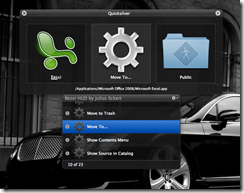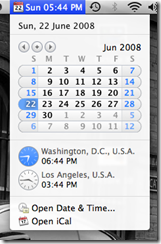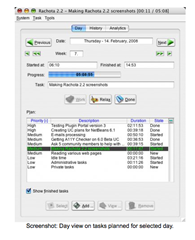

Nintendo, Microsoft stumble while Sony cruises
Posted by M. Talha in Entertainment, Microsoft, Sony, Xbox
UNCONVENTIONAL: If you attended the 2006 Electronic Entertainment Expo in Los Angeles, along with about 60,000 other people, you were probably blown away by the massive audiovisual bombast. If you returned for this year's E3 Media & Business Summit, which only 5,000 attended, you might think the entire video-game industry had collapsed. The Entertainment Software Association's deliberate downsizing of E3 has gotten mixed results. On the one hand, it's a lot easier to get work done, since you don't have to fight through scrums of attendees gawking at scantily clad models that companies hired to demonstrate their wares. And you can buy a cup of coffee at the Los Angeles Convention Center food court without waiting in line for an hour. On the other hand, some of those present this year missed the old spectacle. "Now it's like a pipe-fitters' show in the basement," Ubisoft North America president Laurent Detoc told The San Francisco Chronicle. Also, many of the games expected for the holiday season were announced weeks ago, so E3 surprises were rare. Of the three major console manufacturers, Microsoft probably gave its fans the most to look forward to. Sony was a close second, but Nintendo delivered a lackluster presentation that left a lot of observers scratching their heads. ANIMAL ATTRACTION: Nintendo's E3 press conference focused on three new Wii titles. One, "Animal Crossing: City Folk," was widely expected; it doesn't appear to break much new ground, but fans of the DS and GameCube versions should be happy. The second was "Wii Sports Resort," which will be packaged with the Wii MotionPlus, an accessory that boosts the accuracy of the console's controller. The wild card was "Wii Music," the long-brewing project from Mario and Zelda creator Shigeru Miyamoto. In essence, it's an air-instrument game, in which you mime playing a guitar, a saxophone, drums or 60-some other instruments by waggling the Wii controllers. It's so simple that it's either brilliant or stupid. Asked if it isn't really a toy rather than a game, Miyamoto responded, "It's more interesting than a game." None of these titles got the kind of response that greeted the announcement of Rockstar Games'"Grand Theft Auto: Chinatown Wars" for the portable DS. And gamers can at least take heart in the knowledge that Nintendo's Mario and Zelda teams are developing new projects. BLANK SPACE: The Xbox 360 lineup for the rest of 2008 is much more varied, featuring previously announced titles like "Gears of War 2,""Fable II,""Banjo-Kazooie: Nuts & Bolts" and "Viva Pinata: Trouble in Paradise." Microsoft's E3 event introduced two new party starters: the karaoke game "Lips" and the trivia challenge "Scene It? Box Office Smash!" Microsoft wrapped up its show with the fairly surprising news that Square Enix's "Final Fantasy XIII" will be published on the 360 (rather than just the PlayStation 3, as everyone had assumed). But once the spotlight faded, buzz began to build around a product Microsoft didn't announce: a new "Halo" adventure from Bungie. The day after the press conference, a message on the Bungie Web site revealed that the developer had planned to announce a new game during E3. "However, those plans were just changed by our publisher," Bungie president Harold Ryan wrote. Why would Microsoft bury news about the Xbox's biggest franchise? "We had an embarrassment of riches," Don Mattrick, head of Microsoft's Xbox division, told The Los Angeles Times. (full story Link)
LOS ANGELES — Fevered fans pushed “The Dark Knight,” the sixth in Warner Brothers’ series of “Batman” movies, to record three-day ticket sales of $155.3 million over the weekend, shoring up what so far had been a wobbly year at the movie box office. By Warner’s estimate, the film narrowly eclipsed opening-weekend ticket sales last year of $151.1 million for Sony Pictures’ “Spider-Man 3,” the previous record holder. Including a solid $27.6 million for the musical “Mamma Mia!” from Universal, the weekend’s top 12 films took in about $249.6 million, according to the box office consultant Media By Numbers. That lifted the domestic box office total for the year so far to $5.36 billion. That is still down about 1 percent from last year, and the number of theatergoers is down 3.7 percent. But the weekend performance gave studios and theater owners alike reason to take heart, as it proved that even a familiar franchise like the “Batman” series can still bring surprises. “It just took on a life of its own,” said Dan Fellman, Warner’s president for theatrical distribution. “You never expect anything like this.” Unusual excitement began to build weeks ago around “The Dark Knight,” much of it fed by anticipation of a performance as the villainous Joker by Heath Ledger, the Australian actor who died in January. Theaters began adding midnight and early morning screenings of the film, as fans scooped up advance tickets from the online ticket services Fandango.com and Movietickets.com. At sellout shows around the country, audiences — including more than a few viewers who came made up to resemble Mr. Ledger’s evil clown character — pushed Friday ticket sales to an estimated $66.4 million, including an extraordinary $18.5 million from the midnight showings. That the film’s opening took on an event status that previous “Batman” movies never quite achieved apparently owed something to its strong presence in the outsized Imax format. The film —directed by Christopher Nolan and starring Christian Bale — was filmed partly using Imax cameras, and opened on nearly 100 Imax screens in the United States. That meant a boost at the box office because Imax tickets cost an average of $12.80, about 75 percent more than the overall average ticket price of $7.08, as estimated by Media By Numbers. Imax screenings contributed $6.2 million to the “Dark Knight” box office, beating its previous record, for “Spider-Man 3,” by more than 30 percent, said Greg Foster, the president of filmed entertainment for Imax Corp. To date, the summer box office had been solid, but not spectacular, with ticket for the season up slightly at $2.76 billion, thanks to price inflation, and attendance down about 2 percent. Films like “Iron Man” from Paramount Pictures and Marvel Studios, and “Indiana Jones and the Kingdom of the Crystal Skull,” from Paramount and LucasFilm, topped the $300 million mark. But “Hancock,” an off-center superhero movie from Sony Pictures and the star Will Smith, came up short of last year’s “Transformers” over the July Fourth holiday, and several pictures, including “Meet Dave” from Eddie Murphy and 20th Century Fox fell flat. (full story Link)
Touch screen technology has been with us since the early 1970s and have become increasingly popular in recent years with the advent of mobile phones and pocket computer systems.Touch screens are now everywhere with ATMs, ticket machines and information points utilizing them. They are a key asset in industrial computing too as touch screen monitors offer certain advantages over conventional computer screens.The most obvious advantage of touch screen monitors is that they act as both an input and output device. Using a graphical user interface (GUI) there is no need for a separate monitor, keyboard and mouse as the touch screen monitor acts as all three.In industrial applications, touch screen monitors also have the advantage of being more robust than a conventional CRT (cathode ray tube) or LCD monitor. Touch screens are often built with durability in mind and many are resistant to industrial contaminants such as water, dirt, oil and grease.Many touch screen monitors boast IP65 and NEMA 4 ratings allowing the monitors to be washed-down and protected against, electrical surges, physical impact, temperature extremes, theft, tampering and airborne debris.Touch Screen monitors can also reduce the size of a computer system, without separate peripherals and all those wires, they can also be mounted on walls or on the back of machines.They can also be house in industrial computer enclosures - these afford added protection from spillages, knocks, bangs and even explosive atmospheres. Many touch screen devices are used where standard computer equipment is just not practical such as when a machine is positioned outside or left unattended.There are different technologies behind touch screen monitors such as resistive touch screens, capacitive systems, infrared and surface acoustic wave technology. The types of touch screen Differ in their efficiency at reading a touch and the clarity of the monitor. Some of the systems are also more susceptible to scratches and contaminants.In selecting a touch screen the most important things to remember is where the screen will be placed, what applications it will be used for
 , how durable does it need to be and how clear or bright does the monitor have to be.
, how durable does it need to be and how clear or bright does the monitor have to be.You should have heard about affiliate marketing, it is one of the low cost ways to make money on the Internet. Anyone can earn income through affiliate marketing regardless of their experience in internet marketing, as long as they have the passion and patience to learn and work on affiliate marketing.
This article will provide you 9 important basic tips for succeeding in affiliate marketing.
1. Select a specific niche. Make sure that there are affiliates already making money in the niche as this indicate that the niche is profitable. Then join affiliate programs that are offering products or services appeal to the niche market. It is suggested not to join too many affiliate programs at the beginning to avoid losing focus.
2. Do research and investigation on the affiliate programs before joining them. You should only join rewarding and reliable affiliate programs. The products must be targeted to your niche market and in good quality so that you are able to promote and sell them with less refund rate.
3. You can promote affiliate products without a website. But, it is highly recommended that you build a niche website with interesting content focuses on promoting your affiliate products.
4. Create a budget for your marketing campaigns. Know clearly how much you want to spend on promoting your website and affiliate programs.
5. Traffic and conversion are the keys to generate affiliate commission. You will need to spend most of your time to learn and work on these two aspects. So, be prepared to work hard.
6. Your potential buyers often need supporting information before buying an item. You may write reviews about your affiliate products and ‘how to’ articles with your affiliate links included in the content. This is one of the effective ways to direct your visitors to your merchant’s site and make a purchase.
7. For long-term profit in affiliate marketing, you have to build a list. Some of the methods you can apply to grow a list are offer free gift, free newsletters, free e-courses and participating in a give away event. When you have a opt-in email list, you can regularly contact your target prospects and recommend your affiliate products to them.
8. Your credibility is important. You should often send helpful and interesting information to your opt-in list subscribers. Provide your real name and an email address on your website so that the potential prospects know there is a real person behind the website and contact you anytime when they have question.
9. Most affiliate programs allow you to recruit affiliates under you (sub-affiliates). You will earn more commission if you grow your own network of sub-affiliates. If you have found a few hard working sub-affiliates, you can expect to share a steady commission from the affiliate sales generated by them.
Source : make money

However, as great as it may be that a few of the 3G’s goodies will now be incorporated into your first-gen iPhone, Apple has stated that should you install the v2.0 OS into your existing handset without backing up your data (for which you can use iTunes) you’ll lose all of it.

According to reports, a few users have had some issues with the update, but hopefully those will be rectified by Apple ASAP.
You can download the update file here.
The iPhone 3G isn't the only thing being released this week. Microsoft on Thursday will release its automatic update for Windows XP service pack 3 (SP3).
The updates are expected to hit PCs by 10 a.m. Pacific time, July 10.
"Windows XP SP3 could be released to Automatic Updates as early as Thursday," according to a Microsoft spokesman. "As with all service pack releases, Microsoft will carefully monitor the release to ensure that all customers have a good experience."
The update will not have to be reinstalled, Microsoft said. Microsoft released XP SP3 on May 7 after a compatibility issue delayed its original April 29 release date. Service Pack 3 adds several networking and security improvements, and compatibility with Windows Vista and Windows Server 2008 security credential providers. It also incorporates features previously available individually as separate updates, such as Microsoft Windows Imaging Component (WIC), Microsoft Management Console (MMC) 3.0, and Wi-Fi Protected Access 2. In May, several XP users who installed XP SP3 experienced continuous re-boots. Microsoft later said that the problem was affecting AMD-based machines with Windows XP images that were originally captured by an OE on an Intel-based machine. "The problem is a registry value, present on images created w/ Intel processors, that causes a driver (intelppm.sys) to load at boot," according to a Microsoft Update blog entry. "When intelppm.sys attempts to load on an AMD-based system upon the install of SP3, it causes a blue screen and the continuous reboot." Microsoft said it would add a filter to prevent the reboots.
How much information should Internet companies be able to collect about your Web activity in order to serve you more relevant and targeted advertising? An IP address? Search queries? Your system settings and browser of choice?
For most companies like Google and Microsoft, the collection of that type of data is de rigeuer. Though it is typically deleted 18 months after its collection, and executives swear that personally identifiable information will not be found in their databases, many have their doubts.
My IP address may not reveal my name or location, but if I happen to be Googling my own name, address, or place of employment, and Google retains those search terms, am I inadvertently telling the search engine exactly who I am?
"If my ISP said, 'Is it ok if we give everything you do to another company?' I'd say of course it's not ok," Sen. Byron Dorgan, a North Dakota Democrat, said during a Wednesday hearing before the Senate Commerce Committee. "Online advertising is important; I understand that [but] there are so many unanswered questions about [online] information and how people navigate the Web."
Dorgan grilled Bob Dykes, CEO of NebuAd, an online advertising company that aggregates information to serve up targeted ads. "Maybe an ISP comes in and [says], 'Whenever anyone does something on our system, we're going to shovel all that information to you as its being done. What's the difference between that and wiretapping?"
"We're compliant with the law," Dykes responded. "The information we're looking at as people surf the Web doesn't include any personally identifiable information. [We are taking] an IP address and transforming that into an anonymous number with a one-way hash. All we're keeping is the qualifications from the market segments" NebuAd is targeting.
Leslie Harris, president and CEO at the Center for Democracy and Technology (CDT), was skeptical about the anonymity of the collected data. At best, the data collected by companies like NebuAd is "pseudo-nonymous," she said.
Harris pointed to AOL, which in 2006 mistakenly released 20 million search queries that included indentifiable data. Dykes argued that that was basically because people were doing searches on houses in their neighborhoods using particular names and addresses. That is exactly the point, according to Harris.
Sen. David Vitter, a Louisiana Republican, asked the two panelists if they believed that anyone data collection process on the Internet could ensure true anonymity. Dykes said yes, but Harris did not believe so.
"If pure privacy is what you want, the Internet is probably the wrong thing for you," countered Clyde Wayne Crews Jr., vice president for policy at the Competitive Enterprise Institute, a conservative think tank.
TOKYO - Sony Corp and other Japanese companies said they will team up to jointly develop key technologies to make large-sized organic light-emitting diode (OLED) panels for use in TVs.
OLED panels, seen as promising next-generation flat displays, use organic, or carbon-containing, compounds that emit light when electricity is applied.
Unlike liquid crystal displays, OLED panels do not need backlighting, making them slimmer and more energy efficient. But makers need to clear hurdles such as cutting production costs and maximizing screen size in order to begin mass-producing OLEDs.
Sony and other firms, including a joint venture between Toshiba Corp and Matsushita Electric Industrial Co, will participate in a joint development project initiated by the Japanese government.
Details of the project, which aims to establish basic technologies for making energy-saving, high-definition OLED displays with screen sizes of 40-inch and larger, will be announced soon, participating companies said.
Sony in November started selling the world's first OLED TVs with an 11-inch screen, while South Korea's Samsung SDI Co Ltd said last month that it would boost production of active-matrix OLED displays to six times the current level by mid-2009. The Nikkei business daily said the Ministry of Economy, Trade and Industry will pitch in 3.5 billion yen ($33 million) to help with the project, which would run from this year through 2012.Other participants in the project include Idemitsu Kosan Co Ltd and Sumitomo Chemical Co Ltd.
Shares in Sony were up 1.8 percent at 4,430 yen in early afternoon trade, outperforming the Tokyo stock market's electrical machinery index, which fell 0.3 percent.
HELSINKI - Nine more firms, including telecom operators "3" and TIM, have lined up to support the new open mobile software alliance Symbian Foundation, the world's top cellphone maker, Nokia, said on Thursday. Nokia said on June 24 it would buy out other shareholders of UK-based smartphone software maker Symbian for $410 million and make its software royalty-free to other phone makers, in response to new rivals such as Google Inc. Nokia will contribute Symbian's assets to the not-for-profit organization, Symbian Foundation, in which it would unite with leading handset makers, network operators and communications chipmakers to create an open-source platform. Nokia said the foundation has now 30 members after also mobile operators 3, America Movil and TIM, chip firm Marvell, and services and software providers Aplix, Elektrobit, EMCC Software, Sasken and TietoEnator joined.
Virtual reality is a little 2006, but Google is looking to give it a new spin with Lively, a new 3D 'world' that can be integrated with a number of online applications. The Lively download is available now on Lively.com. Users can create "rooms" that can be embedded on blogs or Web sites and explored via avatars you create yourself. It is currently only available for Windows XP and Vista users using Internet Explorer or Firefox. You'll need a video card with at least 32 MB of video memory, Flash 9 or higher, and a broadband Internet connection. Users must be at least 13 years old to participate, and those under 18 must get a parent or guardian's permission before joining, Google said. "We hope you will use the product to express yourself with and without words, and to do this in the places you already visit on the web," Niniane Wang, a Google engineering manager, wrote in a blog post. "In our user research, we've been amazed at how much more poignant it is to receive an animated hug than seeing the text '[[hug]].'" That research included a trial with students at Arizona State University (ASU). "Based on feedback from ASU students and with help from the Google Desktop team, we added support for playing YouTube videos in virtual TVs and showing photos in virtual picture frames inside our rooms," Wang wrote. "Better yet, the gadgets you have in your Lively rooms can also run on your desktop."
The cell phone market is a dizzying magic show of misdirection. The cheap prices you see for phones are usually for new customers only, with two-year contracts and mail-in rebates. And guess what? The Apple iPhone 3G is just another cell phone.
Because of "activation fees," "upgrade fees" and just plain fees, it turns out the "$199" iPhone never costs $199.
The cheapest price is actually $217. The 8GB iPhone will cost $199 plus an $18 "upgrade fee" – or $217 – if any of these things are true:
- You have an original iPhone, or
- You are out of contract, or
- You have an AT&T plan of $99/month or more and you haven't gotten a new phone in 12 months, or
- You have an AT&T plan of $69/month or more and you haven't gotten a new phone in 21 months.
If you're an AT&T customer who isn't eligible for the $199 upgrade (i.e. you're deep within your contract), the iPhone 3G will cost $399.
If you want your iPhone on July 11, AT&T says you'll have to sign up for a two-year contract. But "in the future," a prepaid option will be available – for $599.
The 16GB iPhone costs $100 more than the 8GB model in all cases – so, $317, or $335, or $499, or $699.
Got it? The service plans are also a pain, but they're just the usual, standard, run of the mill AT&T smart phone service plans. The iPhone isn't special in AT&T's systems any more; it's just an ordinary smart phone.
Typically, those service plans cost whatever a voice plan costs ($39.99-99.99/month), plus $30/month for data. But there's one extra catch: those plans don't include text messages. So you'll need to add $5/month for 200 messages, $15/month for 1500 messages or $20/month for unlimited messages. If you're buying the phone on a business account you have to tack on an extra $15/month, just because.
All of this is normal. Confusing, but normal. These price differences happen with every cell phone. It's just the way our market works.
TOKYO (Reuters) - Japanese videogame maker Square Enix Co Ltd said on Tuesday it had launched its first game for Apple Inc's iPod, broadening its target hardware to the top-selling media player.
Square Enix, known for such blockbuster titles as "Final Fantasy" and "Kingdom Hearts", began offering the "Song Summoner: The Unsung Heroes" roll-playing game this week in Apple's iTune store.
The game goes for $4.99 in the United States, 4.99 euros ($7.84) in Europe and 600 yen ($5.60) in Japan.
Unlike some iPod games, which are modified versions of mobile phone games, "Song Summoner" was developed exclusively for iPod and is designed to take advantage of the machine's functionality.
A game player picks a song stored in the iPod and the song determines the types and abilities of the fighters in the game, or "Tune Troopers".
There is no sales target for the game, a Square Enix spokeswoman said.
Shares in Square Enix slipped 1.5 percent to 3,280 yen in late afternoon trade in Tokyo, outperforming the Nikkei average which fell 2.5 percent.
($1=107.06 yen)
($1=.6367 euro)
(Reporting by Kiyoshi Takenaka; Editing by Brent Kininmont)
SAN FRANCISCO/NEW YORK (Reuters) - Microsoft Corp and Yahoo Inc have been holding separate talks with other potential media partners after their negotiations with each other broke down, sources familiar with the companies' thinking said on Wednesday.
Microsoft—rebuffed this year in efforts to buy all of Yahoo and then just its search business—is talking about alternative deals with Time Warner Inc, which owns AOL, and News Corp, parent of MySpace, a source close to Microsoft said, but any negotiations remain in preliminary stages.
Meanwhile, talks have continued for months between Yahoo and Time Warner over a potential merger of AOL with Yahoo to create a more formidable advertising and media player, but they are no closer to a deal, a source close to the matter said.
Shares of Yahoo jumped as much as 9 percent on Wednesday after the Wall Street Journal reported that Microsoft, positioning for a new run for Yahoo's search business, had in recent days approached media companies to join together on a deal that would effectively lead to Yahoo's breakup.
However, a Reuters source and a CNBC report, citing unnamed sources, later said there were no new talks or negotiations.
The Journal also said Microsoft met with activist investor Carl Icahn in recent days to encourage him to press his proxy battle for control of Yahoo's board, the first sign Microsoft welcomed his month-old campaign. This development also was attributed to unnamed sources familiar with the talks.
Icahn was not available to comment on the report.
Microsoft, Yahoo, Time Warner and News Corp all declined comment.
REVIVING HOPE
Wall Street analysts said the latest news revived flagging hopes among some investors that Microsoft was still interested in doing a deal with Yahoo. "The hopes that Microsoft would come back were getting crushed over the last 10 trading days," Collins Stewart analyst Sandeep Aggarwal said.
Yahoo stock ended the day up 3.4 percent at $20.88. The stock had traded as low as $19.58 on Tuesday, near its level in late January before Microsoft made its unsolicited takeover bid for Yahoo, sending the stock above $30 by mid-February.
Microsoft shares fell 3.7 percent to $25.88 on Wednesday. In the prior day's trading, Microsoft fell to two-year lows of $23.19, intraday, before recovering.
Analyst Youssef Squali of Jefferies & Co said the sharp Yahoo stock reaction was most likely a defensive move by short-sellers seeking to cover bets a Microsoft deal was off.
"Even the rumor that Microsoft is getting interested again is enough to have people to want to cover their bets against Yahoo stock," Squali said, adding that many investors have shorted Yahoo from the high $20s all the way down below $20.
Adding to the volatility were options investors who placed fresh bets Yahoo would be trading up to $27.50 by October, said analyst Rebecca Engmann Darst of Interactive Brokers Group.
THE WAITING GAME
Several financial analysts said a key detail in the Journal report was that Microsoft and Yahoo executives had sought to revisit the merger on May 17—two weeks after Microsoft walked away—and that two Yahoo board members in the meeting had said they would settle for a merger worth $33-$34 a share.
On May 3, Yahoo rejected a $33-a-share Microsoft offer worth $47.5 billion, and earlier this week questioned whether the software maker was ever serious about a full-scale merger.
The source familiar with Microsoft's thinking confirmed that Yahoo had belatedly sought a deal in mid-May worth $33 to $34, but that Microsoft was no longer interested at that point.
The source said Microsoft executives considered the early May deadline as vital to winning regulatory approval before the end of the year—when a new presidential administration arrives and months more delays would likely occur.
Microsoft also become convinced that Yahoo executives were passively resisting the deal and unwilling to seriously negotiate. Meanwhile, the economy has taken a toll on the online ad market, and with it, the value of buying Yahoo.
"Microsoft is going to let Icahn do the dirty work and hand Yahoo over to them," Jefferies & Co's Squali said, adding that it was in Microsoft's interest to hang back and let Yahoo shares settle lower as investors quit betting on a takeover premium.
In the long run, however, Microsoft needs Yahoo more than Yahoo needs Microsoft, he argued.
"Microsoft has a gaping hole in its strategy and it's called the Internet and it's only getting worse because Google is encroaching on Microsoft's business," Squali said.
Separately, the U.S. Justice Department is pursuing a formal antitrust investigation into a deal reached last month between Yahoo and Microsoft-archrival Google Inc to team up on Web search advertising.
Google, with more than 60 percent of the Web search market, and Yahoo, with 16.6 percent, agreed to a deal for Google to run search ads on Yahoo's site in a partnership that could mean $250 million to $450 million in new cash flow for Yahoo.
Google said it was confident the deal would enhance overall industry competition, but declined to discuss the probe.
(Additional reporting by Ajay Kamalakaran in Bangalore, Franklin Paul in New York, Diane Bartz in Washington, D.C., Doris Frankel in Chicago; Editing by Derek Caney, Leslie Gevirtz, Gary Hill)
TAIPEI, July 7 (Reuters) - Quanta Computer and Compal Electronics, the world's top two contract laptop PC makers, forecast a 20 percent or more jump in their third-quarter shipments from the second quarter, powered by demand from emerging markets and for low-cost PCs.
Quanta, which makes PCs for customers including Hewlett Packard and Dell, has yet to see a negative impact on its sales from the global economic slowdown, Vice President Elton Yang said on Monday.
"The main driver behind the rise is from low-cost PCs," he said at an investor event sponsored by the Taiwan stock exchange.
Compal attributed its strong outlook to growing laptop demand in China, India and eastern Europe, which would outweigh slowing U.S. demand, said Gary Lu, the company's chief financial officer.
Quanta and local rival Asustek Computer are expected to benefit from growing demand for low-cost PCs as a U.S.-led economic slowdown forces consumers to cut back on spending.
"The company (Quanta) is not being affected by the economic situation and rising manufacturing costs," Quanta's Yang said, adding Quanta's full-year target to ship 40 million laptops remained unchanged.
Last month, Quanta predicted global notebook PC shipments would grow 25 percent this year on healthy consumer demand, even though corporate demand was slipping.
It added it expected its own low-cost notebook shipments—one of its fastest growing segments—to hit around 10 million this year as top brands try to tap demand from emerging markets for 8-10 inch, cheaper PCs, known in the industry as Netbooks.
Shares of Quanta ended up 1.3 percent on Monday, roughly in line with 1.6 percent jump in the broader market . Compal's stock fell 0.6 percent.
BRUSSELS (Reuters) - Microsoft has told a European Union court that an antitrust fine of 899 million euros ($1.4 billion) against it is both excessive and disproportionate, the Court of First Instance said on Monday.
On February 27 the European Commission found that Microsoft used high prices to discourage competition, failing to carry out sanctions imposed against it as part of a long-running case. Microsoft is appealing against the fine imposed in February.
"The Commission failed to take due account of the fact that the contested decision only concludes that the royalties allegedly established by Microsoft under one particular license ... were unreasonable," the court said in summarizing Microsoft's arguments, published in the EU's Official Journal.
A Commission spokesman disagreed.
"The Commission is confident that its decision to impose the fine was legally sound," Jonathan Todd said.
The company argued that the Commission made a "manifest error" by labeling its rates as unreasonable without considering that they were "intended to facilitate negotiations between Microsoft and the prospective licensees."
As well, Microsoft and the Commission had agreed to have a trustee review the rates if need be, in a mechanism that had been used in another case, Microsoft argued.
The Commission also erred by the yardstick that it used in requiring Microsoft to establish its trade secrets were innovative, ignoring many arguments prepared by patent experts, the company said.
"The Commission also denied Microsoft's right to be heard", because it failed to give the company a chance to give its views at the end of the period for which it was fined, Microsoft said.
The Commission has said it imposed the fine because the U.S. software group had defied a 2004 order from Brussels to provide information to competitors on reasonable terms.
Microsoft has been fined a total of 1.68 billion euros by the EU for abusing its 95 percent dominance of PC operating systems through its Windows operating system.
The 899 million euro fine was the biggest ever imposed on a company by the EU executive.
The Commission initially fined Microsoft 497 million euros in March 2004 for withholding interoperability information for "work group server" software and for deliberately damaging rivals by tying its Windows Media Player to its Windows system.
Microsoft unsuccessfully appealed against that penalty and was also later fined 280.5 million euros by the Commission for non-compliance.
The latest fine picked up from where the 280.5 million euro penalty left off, covering the period from June 21, 2006 until October 21, 2007.
The company announced its appeal of the latest fine in May.
(Reporting by David Lawsky)
With more and more attorneys adopting Macs throughout their offices every day and the business world raving about the cost effectiveness of Mac OS X, today Macs are an accepted and feasible alternative to Windows in the legal community. Having recently made the switch to a Mac myself, I’ve put together a list of the top ten free Max OS X programs that made switching from a PC to a Mac a breeze.
1. Quicksilver
Quicksilver is a program launcher that uses simple commands to rapidly bring up any program, file, folder, or website. Quicksilver learns what files and programs are most often accessed and adapts so that those items are pulled up almost instantaneously when the user starts typing the name of the item in the Quicksilver interface.
For example, in screenshot below, I pulled up the Quicksilver interface with a single keystroke and then by typing in “ex” brought up Excel. Using the tab key I was able to bring up specific commands such as the option to open a specific excel document, move a document to another folder, or email a specific file. Quicksilver is very intuitive and allows users to execute specific commands so quickly that using the built-in OS X dock to open a program seems slow by comparison.
2. Anxiety
Anxiety brings the iCal task list to your desktop. It provides easy access to your to-do list so that tasks can be added or marked as complete without opening your full calendar. Anxiety stays in sync with iCal and disappears when not in use.
3. Caffeine
OS X has a great power saving feature built-in: after a short period of inactivity the screen automatically dims. Caffeine allows you to turn this feature on and off with a single click so that presentations can be run without interruption. It also prevents your Mac from going to sleep or starting the screensaver.
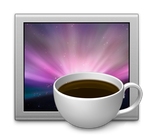
4. Growl
Growl provides unobtrusive notification messages from various programs that run on OS X, including Adium, Firefox, and iTunes. They simply pop up as semi-transparent notifications on the top right corner of your screen and then disappear.![]()
5. Adium
Adium is by far the best instant messaging program I have ever used. You can seamlessly send messages to your friends using various protocols including AOL Instant Messenger, Yahoo Messenger, Google Talk, and MSN Messenger. Adium also supports tabbed conversations so you can keep all your conversations in a single window.

6. Smultron
While there are a number of free text editors available for OS X, my favorite is Smultron. Smultron allows you to have multiple documents open at the same time in an easy-to-use tabbed interface. Another popular free text editor for OS X is TextWrangler while users who want a word processing application with features closer to what Word or Pages offers, Bean is worth checking out. 
7. Skim
Skim is a PDF reader that is cut above Preview, the default viewer in OS X, because of Skim’s enhanced markup capabilities. You can easily add notes, highlight portions the document, and quickly jump from one marked-up section to the next through a convenient side panel. Skim also allows you to create presentations and then run the presentations using the Apple Remote.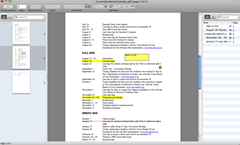
8. VLC
VLC is media player that supports most modern digital video formats including the DVD format and various streaming protocols. Installing VLC will save you the trouble of having to find a compatible player every time you need to play a new media format.
9. iStat Menu
One of my favorite features in Vista is the pop-up calendar that is displayed when you click on the time in the taskbar. iStat Menu brings that feature to OS X. It also allows you to display multiple time zones, open your iCal calendar, and add additional menus that display everything from the temperature of your Mac to the remaining space on your hard drives.
10. Rachota
Rachota allows users to track the time spent on various projects. Rachota can also summarize how much time was spent on each project and provide helpful time-maximizing tips.
RALEIGH, North Carolina - Apple Inc.'s new iPhone 3G and accompanying App Store is set to put the company known for technology innovation into another lucrative space—gaming.
Like iTunes, the App Store will allow users to easily buy and download games from publishers and developers while providing trailers, user-generated reviews and even some free game demos. There are already over 175 games available.
Neil Young, president of new iPhone-focused game development studio ngmoco, said iPhone users are spending over 60 percent of their time on the device on features other than phone calls.
"That's a really big deal because it's no longer just a phone. It's a media player, an Internet player, a camera and a games machine that also happens to make telephone calls," he said.
"Apple absolutely gets gaming with iPhone ... Just look at the air time that Apple is dedicating to games and that shows you that they consider games to be a key application for the device." Young left his job as head of Electronic Arts' Los Angeles studio, where he collaborated with Steven Spielberg on game projects like "Boom Blox" for Nintendo Co Ltd's Wii, to focus on creating original iPhone games, which are also playable on any iPod touch device.
"The things that are really exciting to us are games that take advantage of not just the iPhone's accelerometer (a tilting mechanism) or the touch screen, but media that exists on the device and the fact there's a camera and GPS there," he added.
"We can bring awesome gameplay mechanics together with these new technologies and build gaming experience that frankly no one has experienced before."
CALLING THE GAME
EA Mobile has a trio of casual-focused launch titles for iPhone—Tetris, EA Sudoku, and Scrabble—as well as an exclusive iPhone version of "Spore" shipping September 7, which will allow players to navigate a one-celled organism through the game world by simply tilting the screen. Creating new species is done by touching the screen."Games are the obvious next step for the iPhone's entertainment capabilities," said Travis Boatman, vice president of Worldwide Studios for EA Mobile.
"The platform gives consumers a very in-depth game experience in terms of sheer horsepower and graphics capabilities."
In terms of performance, the iPhone has the visual fidelity of Sony Corp's PSP and the performance of a Nintendo DS, according to Gonzague de Vallois, senior vice president of publishing at mobile game publisher Gameloft.
Games for the platform are not limited by size constraints, which the Nintendo DS faces with its cartridges. Gameloft has titles as large as 100MB (megabytes), which is something unheard of for a mobile phone game.
Currently the number two publisher of iPod games, Gameloft has worked closely with Apple as an iPhone development partner on the new 3G device's gaming capabilities. The company has six launch titles: "Block Breaker Deluxe," "Brain Challenge," "Platinum Sudoku," "Platinum Solitaire," "Diamond Twister" and "Chess & Backgammon."
Although developed in just 12 weeks, each of these games makes use of the touch screen and accelerometer.
But the company's second wave of games, including the late August release of "Asphalt Racing 4: Elite Racing," will delve even further into iPhone's gaming capabilities, including Wi-Fi multiplayer racing and the ability to steer cars with either the touch screen or by accelerometer
Philippe Laurens, senior producer at Gameloft, envisions the iPhone camera coming into play down the line, whether it's used for players to insert their face into a game or incorporated into gameplay like requiring the player to photo something red.
"The cool thing is that Apple gave us a lot of cool tools that enables us to use things like the camera and the GPS within gameplay," said Laurens.
NEW YORK - Yahoo Inc said on Thursday it would offer its users hundreds of popular casual online games as free downloads backed by revenue from advertising integrated into the games.
More than 400 ad-supported games from top casual games publishers like Anarchy Big Fish Games and Sugar Games will be available to users before year-end, Yahoo said.
The company is working with technology providers Double Fusion and NeoEdge to sell and integrate video ads into the Yahoo! Games catalog.
Casual online games are usually games developed for mass consumers. They rarely require much expertise or time to play.
Some of the most popular casual games include Solitaire, Tetris and Bejeweled, and many players of such games are women between the ages of 35 and 54.Yahoo said in-game advertising will allow it and its publisher partners to drive revenue by providing advertisers access to a coveted demographic of gamers.
Unfortunately, neither IPv4 or IPv6 are incompatible, which means that any IPv4 device will have to be assigned an IPv6 number. IPv4 to IPv6 connections will either have to be translated or tunneled, like a VPN connection, via a router.
And that means that the IPv4-to-IPv6 transition will likely be anything but simple. "The response that the global Internet industry will undertake an overnight transition to use IPv6 is perhaps at one somewhat improbable end of a rather broad spectrum of possibilities here, if only from the consideration of the implausibility of such timing in a network of tis [sic] size," Huston wrote.
However, the transition will likely be easier for some countries than others. According to OECD data collected in March, Germany, Japan, France, and Australia lead in terms of the number of IPv6 domains actually deployed; the United States is thirteenth, with 0.62 percent of the overall domains. Japan already has several IPv6 networks already deployed. About half of the top-level domains are IPv6 enabled.
Several solutions have been suggested to increase the pool of IPv4 addresses, ranging from market-based allocation, which could increase the cost of registering a new domain and benefit enterprises at the expense of users; seeking out "expired" blocks of IP addresses registered by defunct companies; or "seizing" blocks that are held but not used.
The bad news is that one of the easiest ways to forestall the exhaustion of these IP addresses is already in wide use: network address translation. The premise of the IP protocol, and especially IPv6, was to give each device on the network its own IP address. A PC connected to a NAT router receives its own sub-address, forcing the router to manage the packets flowing in and out of it, and assigning each to the proper PC. But since the router is an intermediary that requires some intelligence, router makers have added firewalls to sniff the packets further, and try and prevent hackers from penetrating the home network.
To date, virtually no home router supports IPv6; typing in "IPv6" on Netgear's Web page, for example, returns no results. But replacing the manufacturer firmware with a third-party application like Tomato does allow a determined user to add IPv6 support, although in that case the router becomes a bridge.
However, both Windows Vista and Windows Server 2003 both support IPv6 to some extent. By using Internet Connection Sharing, a Vista PC can act as a "6to4" router, using the IPv4-based Internet as a whole as just a cloud to tunnel an IPv6 connection through, encapsulating the traffic with an IPv4 header. A complementary technology called "Teredo," part of Windows Vista, was designed as a last resort for IPv6 connectivity, allowing a PC behind a NAT to tunnel to another NAT-protected device across the Internet. "As more IPv4 NATs are upgraded to support 6to4 and IPv6 connectivity become ubiquitous, Teredo will be used less and less, until eventually it is not used at all," according to Microsoft.
That makes measurement of IPv6 traffic extremely difficult. According to the Amsterdam Internet eXchange, the amount of IPv6 traffic is just 0.1 percent of the total. But IPv6 traffic tunneled using IPv4 protocols could mean that much more is being used, just beneath the surface.
Some companies have already bit the bullet. Comcast, for example, has already rolled out IPv6 from its core backbone out to its cable modem termination systems in 2007. However, the project required four years, and is still ongoing. "The primary lesson from Comcast's transition to IPv6 is the importance of planning ahead," the OECD concluded.
In an estimated three years or so, the Internet will run out of the IPv4 addresses that it is currently based upon, forcing a transition over to a next-generation IPv6 address scheme – or a halt to all new domains.
That prediction was made last month by the Organization for Economic Co-operation and Development, which told attendees of a worldwide meeting in South Korea that the current address space would run out in 2010 or 2011.
That estimate, in turn, was based upon a Web algorithm that pegs the date at which the Internet Assigned Numbers Authority (IANA) will run out of unallocated Internet addresses, or about Jan. 18, 2011. After that, the estimate is that the first regional Internet registry (RIR), such as the American Registry for Internet Numbers would run out of addresses and be unable to find another on or about Jan. 5, 2012.
At that point, barring some other solution, the Web would essentially be limited to the existing number of domains and sub-domains. The shift to IPv6, however, is seen as a way to escape.
Web addresses such as PCMag.com translate to IP addresses like 96.17.8.27, the actual address for the server on the Internet; the Web address is simply an easier way to remember the numerical address, like 1-800-DOMINOS can be used to quickly call for a pizza.
The problem is that every router and server requires its own unique IP address. As more and more are added to the Internet, the available pool of IP addresses decreases. Gadgets like Microsoft's Zune, which includes a Wi-Fi connection, simply contribute to the "Internet of things" that also require their own IP addresses.
The 32-bit IPv4 address space allows for a theoretical 4.2 billion IP addresses. A 128-bit IPv6 address scheme allows for 2E128 addresses, or "340 billion billion billion billion" addresses. But neither scheme is compatible with the other, making the transition an extremely complicated matter.
In June, the OECD issued its Seoul Ministerial Declaration, a report and call to arms about the impact of changes to the Internet's structure, and their economic effects. "It also calls upon governments and industry to accelerate the transition from IPv4 to IPv6, thus providing a solution to the address space problem as we indeed risk falling short of internet addresses within 3 years, a situation which the "Internet of things" will further deteriorate," said Viviane Reding, a member of the European Commission responsible for Information Society and Media. "Three weeks ago, the European Commission actually set the target that 25% of European internet users should be able to connect to the IPv6 internet by 2010. We will be pushing for it, notably by encouraging public services and leading websites to move faster to IPv6."
The problem is that as the shortage of IPv4 issues becomes more broadly publicized, a "run" on the remaining addresses becomes a possibility.
"This is perhaps a very conservative projection of a date for the exhaustion of the current address allocation policies," the author of the "Potaroo" algorithm, Geoff Huston, who serves as the chief scientist of APNIC, the RIR overseeing Asia and Australia, wrote. "Its [sic] probable that an industry response to this forthcoming situation is one of increasing levels of demand for the remaining unallocated address resources, given the impetus of a "last chance rush" on the registries. If such a run on the unallocated address pool eventuates, and industry players bring forward their requests for additional address space, it is possible that this unallocated address pool exhaustion date may occur sooner than the model studied would apparently indicate."
A corresponding study by Tony Hain of Cisco in 2003 concluded that the IPv4 address pool would be exhausted anywhere between 2009 and 2016, depending upon the forecast model chosen. He added one caveat, however: "Although a longer lifetime projection helps to avoid short-term panic, it can mislead people into believing there is substantial time to worry about this later, resulting in a much bigger problem when reality blindsides everyone sooner than they expected." Next: What to Do?
JUMPING TO THE URL AND SERACH FIELD:
To quickly jump to the URL field and type a website address in Firefox, use the keyboard shortcut (Ctrl)+(L). also you can use (Ctrl)+(K) to jump to the search field next to it.
ZOOMING WITH THE KEYBOARD IN OPERA:
In Opera, you can zoom in with the keyboard using the (Ctrl)+(+) and (Ctrl)+(-) keys in 10 percent steps. With (Ctrl)+(0), you can switch back to the 100 percent view.
CALCULATING WITH BINARY DIGITs:
Change the view of the calculator to "View > Scientific" to show a professional mode and convert binary numbers to hexadecimal values.
PREVENTING AUTO START:
Keeps the (Shift) key pressed when inserting a CD or DVD and when closing the optical Drive-this stop them from running automatically.
REACTIVATING HIBERNATION MODE:
If the hibernation mode refuses to function, you can reactivate it by typing the command “powercfg/hibernate on” in a command prompt windows.
DISPLAYING THE MENU BAR IN VISTA:
Click “Organize” in the action bar and select “layout > menu bar” to always display the classic menu bar in windows Explorer under Vista.
CONTROLLING WINDOWS MEDIA PLAYER:
Use (Ctrl)+(Shift)+(F) of (Ctrl)+(Shift)+(B) for fast forwarding and rewinding.
SELECTING SENTENCE IN WORD:
To select a sentence in Word, keep the (Ctrl) key pressed and click at any place within the sentence.
AUTO WRITE PROTECTION IN EXCEL:
When you open an Excel table using a shortcut with the "/r (Path)\(filename)" parameter added to it. it automatically become write-protected.
TEXT DISPLAY IN OPENOFFICE:
With (Ctrl)+(Shift)+(J), you can use the entire image area in OpenOffice for viewing text, or switch back to the smaller default view.
READING OUT INFO ON BLANK DISC WITH NERO:
Nero can display information about the manufacturer of blank CDs/DVDs. when you open "Recorder > Medium information", keep (Shift) pressed and click "Update".
DEFINING EDGE SHARPNESS IN PaintShopPro:
In Paint Shop Pro, define the "Edge sharpness" with "Selection" in the style pallet for the soft-focus contour efect when copying from picture sections.
O2’s pre-order system falls flat
iPhone 3G hopefuls awoke Monday to emails and text messages from O2 announcing that they could pre-order their new Apple handset beginning at 8:00 a.m. local time this morning.
"If you want to place your order, all you need do is click on the link below on your Mac or PC, select the tariff, select the iPhone 3G model and sign a new 18-month contract online," the carrier said in its messages.
Successful pre-orders were to be delivered by a courier on launch day, Friday July 11th, and customers were to be able to complete activation through iTunes from their homes.
Minutes later, however, O2’s automated upgrade system for existing iPhone owners buckled under pressure and was taken offline, leaving those customers without a means of placing their upgrade order.
At the same time, the pre-order system for new iPhone customers continued to function without a hitch, frustrating existing owners who were suddenly at a disadvantage given that O2 said it was taking pre-orders on a "first come, first served basis."
Faced with these issues, O2 hours later would shut down its pre-order system completely. A message on the carrier’s website now informs customers that due to "huge demand," iPhone 3G is currently out of stock online. Customers are asked to check back for more information on Thursday, July 10th.
O2’s iPhone 3G tariffs
The UK carrier has priced the 8GB iPhone 3G at £99 and the 16GB model at £159 with a £30 monthly tariff that includes 75 minutes, 125 text messages, and unlimited data.
A £35 tariff offers the handsets at identical prices and includes 600 minutes, 500 text messages and unlimited data.
Customers who step up to the £45 tariff get an 8GB iPhone at no cost, or a 16GB model for £59. The monthly plan includes 1200 minutes, 500 text messages and unlimited data.
Either iPhone 3G model is free with O2’s £75 top-tier tariff that includes 3000 minutes, 500 text messages, and unlimited data each month. All tariffs require that customers agree to a new 18-month contract.
Microsoft will start talking about DirectX 11 in less than two weeks. Sources have confirmed that Microsoft game technology conference, previously known as Meltdown and now renamed to Gamefest 2008, will be the place where Microsoft plans to officially announce DirectX 11. This conference takes place on the 22 and 23 July in Seattle, Washington and it will set you back $550 if you register online. You can find some more details about the conference here. The big feature of DirectX 11 is Tessellation/Displacement while we also heard that Multithreaded Rendering and Compute Shaders are part of it. DirectX 11 also brings Shader model 5.0 but we don’t know many details about it. It looks like DirectX 11 will stick to rasterization as there is no any mentioning of Ray tracing support. Nvidia will also talk about DirectX 11 at its Nvision event / conference in late August 2008.
Categories
Archives
-
▼
2008
(33)
-
▼
July
(24)
-
►
Jul 13
(11)
- Microsoft XP SP3 to Hit PCs Thursday
- Can Internet Activity Ever Be Truly Anonymous?
- Sony, Other Firms Team Up for OLED Panels
- Nokia Says 9 More Firms Sign up For Symbian Pact
- Google Tackles Virtual Reality With 'Lively'
- What the iPhone 3G Will Really Cost You
- 'Final Fantasy' Developer Launches iPod Game
- Microsoft, Yahoo Media Talks Still Ongoing
- Taiwan Notebook ODMs Predict Q3 Surge
- Microsoft Calls EU Fine 'Excessive'
- Ten Free Mac OS X Programs that Make the PC to Mac...
-
►
Jul 13
(11)
-
▼
July
(24)
